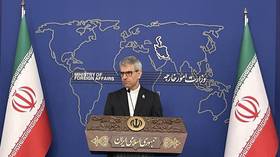New Zealand accuses China of hacking its parliament

New Zealand’s spy agency has claimed that a hacking group sponsored by the Chinese government carried out a cyberattack against the country’s parliament, stealing data on some of its MPs. Beijing has dismissed the accusation, which it says isn’t supported by any evidence.
The alleged breach occurred in 2021 and targeted the Parliamentary Counsel Office and the Parliamentary Service, Government Communications Security Bureau (GCSB) Minister Judith Collins said in a statement on Monday.
The “malicious cyber activity” was swiftly detected by New Zealand’s authorities, which prevented the hackers from accessing data of a “strategic or sensitive” nature, she said.
According to Collins, a group called Advanced Persistent Threat 40 (APT 40), which the GCSB claims is linked to China’s Ministry of State Security, was responsible for the attack.
“The use of cyber-enabled espionage operations to interfere with democratic institutions and processes anywhere is unacceptable,” she said.
The GCSB minister said Wellington had confronted Beijing about the alleged cyberattack, but stressed that New Zealand had no plans to sanction China over the incident.
The statement by Collins came on the same day as the US Department of Justice released photos of seven Chinese nationals wanted on charges of infiltrating the communications of British and American targets over a 14-year period through malicious emails.
The men were said to be members of an entity described as a state-sponsored hacking group, known as APT 31 or ‘Violet Typhoon.’
The GCSB minister emphasized the importance of a collective response by the West to the alleged cyber-security threat posed by China, saying “it’s important [that] liberal democracies stand up for other liberal democracies.”
The Chinese embassy in New Zealand dismissed the accusations by Wellington as “groundless and irresponsible,” saying Beijing had expressed “strong dissatisfaction and resolute opposition” to the island nation’s authorities.
“When investigating and determining the nature of cyber cases, one needs to have adequate and objective evidence, instead of smearing other countries when facts do not exist, still less politicize or even weaponize cybersecurity issues,” the embassy said in a statement on Tuesday.
Beijing doesn’t meddle in the internal affairs of other countries, and “accusing China of foreign interference is completely barking up the wrong tree,” the Chinese diplomats added in an apparent reference to the US.
China is ready to promote cooperation with Wellington “on the basis of mutual respect” and hopes that New Zealand will also work in the same direction, and refrains from “megaphone diplomacy,” the statement read.













